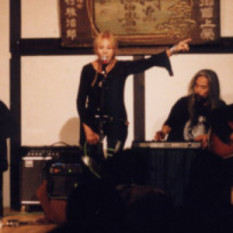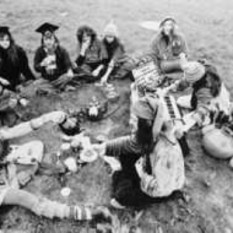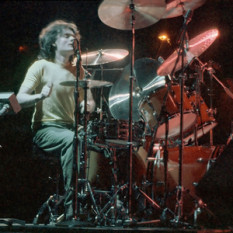Though the Gongmaison album was initially intended to be the self-titled debut album of the Gong offshoot featuring band mainstays Daevid Allen and Didier Malherbe, over time it has come to be considered a part of the discographical continuum of Gong proper. Within a couple of years, this version of the band began simply calling itself Gong anyhow. Allen, who founded Gong in the late ‘60s, had worked briefly with the members of Material as New York Gong ten years earlier, but had then returned to Australia and become involved in a variety of other projects. In 1989, along with sax and flute man Malherbe and members of Gilli Smyth's other Gong offshoot, Mother Gong, he returned to the world he had created, with Gongmaison. In fact, the album is closer in feel to some of Allen's solo work. While there are some extended spacy workouts, and the opening track is actually a disco-tinged reinterpretation of the classic Gong track "Flying Teapot" (here titled "Flying Teacup"), a more acoustic-based, psych-folk flavor prevails throughout much of Gongmaison. When Allen's acoustic guitar, Malherbe's sax and flute, and/or Graham Clark's violin lead the way, as on "Titti-Caca" and "Negotiation," there's a pronounced folk-rock feel, albeit buoyed by the more exotic flavor of Shyamal Maitra's tablas. While the faux-reggae track "1989" and the unnecessary bonus track dance remix of "Flying Teacup" are the low points here, the aforementioned acoustic-based cuts -- epic-length tunes that took up more than half of the original LP -- are worth the price of admission for anyone enamored of Allen's solo releases, even if they're not quite up to the standard of prime-era Gong. .
Anda dapat menemukan informasi melalui mesin pencari musik terbaik - Muzlan.top 😊Semua materi berdasarkan permintaan "Gongmaison" tersedia di halaman Gongmaison
Ya tentu saja. Anda dapat mendengarkan lagu di halaman Gongmaison
Ya tentu saja. Anda dapat mengunduh trek di halaman Gongmaison
Halaman ini ditemukan oleh query: Gongmaison free download, Gongmaison song listen, Gongmaison songs download, Gongmaison remix, Gongmaison mp3 download



